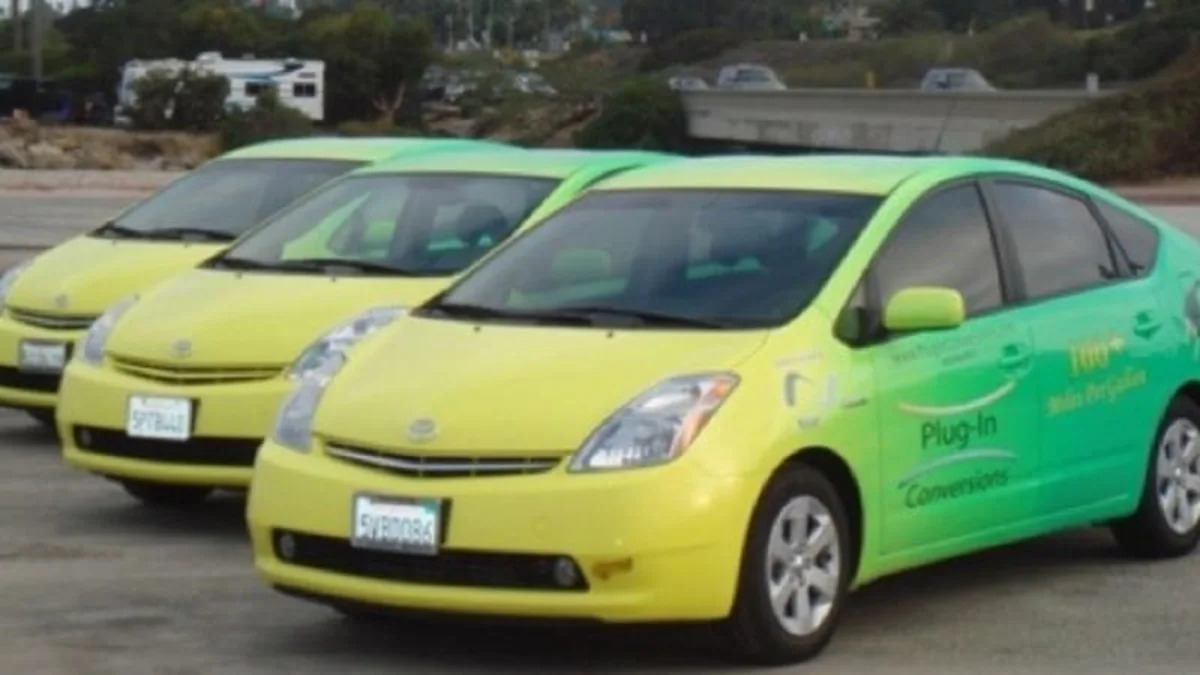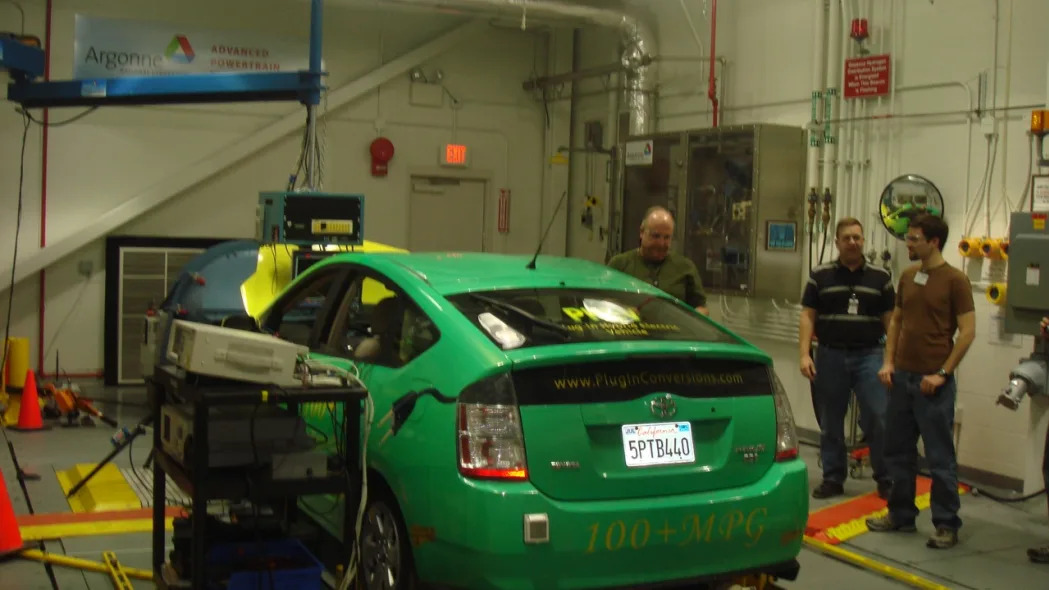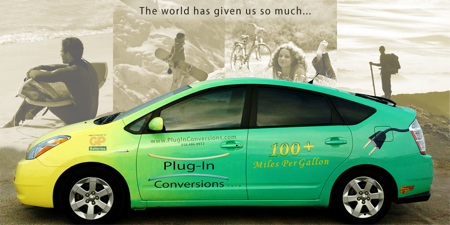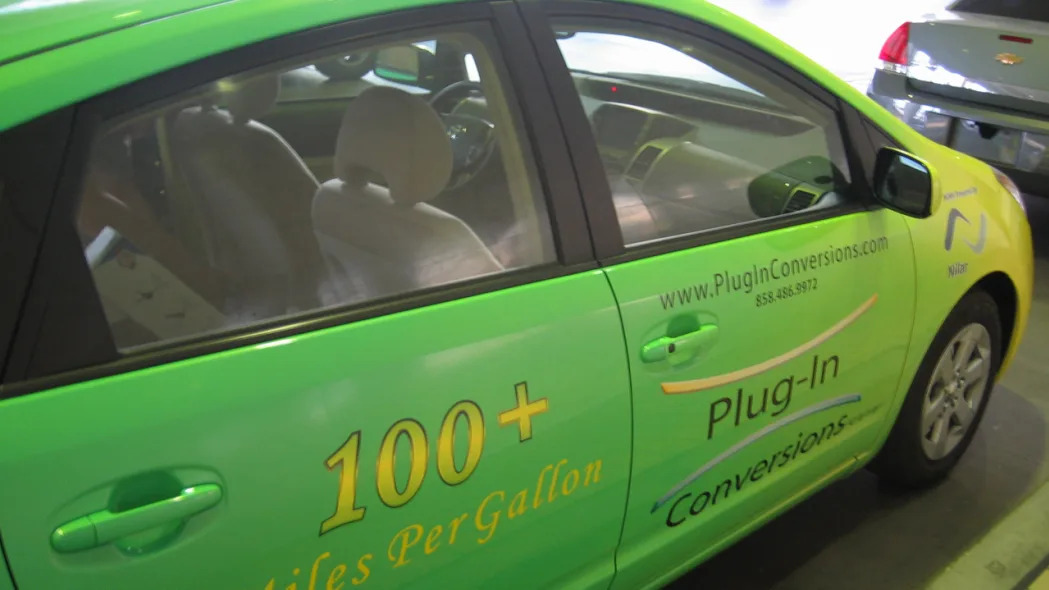Thanks to a beefed up bit of software, Priuses converted to plug-in drive by Plug In Conversions Corp. (PICC) have gotten quite a bit better. They can now go up to 70 mph using nothing but their batteries and get 170 mpge. The software manages to get around Toyota's built-in top speed limitation of 34 miles per hour in EV mode, as PICC president Kim Adelman told us when we spoke to him at EVS23. All of this goodness doesn't come cheap: the software upgrade will cost customers anywhere between $2,000 and $2,500 on top of the $12,500 conversion; at least there will be a free trial version available at some point. The software goest on sale later this month.
In PICC's announcment of the upgrade (which you can read after the jump), there was no explanation of how Argonne National Laboratory tested the car recently and calculated the 170 mpge number, but, previously, PICC's best and most expensive packs could get around 25 miles of EV-only range.
In PICC's announcment of the upgrade (which you can read after the jump), there was no explanation of how Argonne National Laboratory tested the car recently and calculated the 170 mpge number, but, previously, PICC's best and most expensive packs could get around 25 miles of EV-only range.
[Source: PICC]
Photos courtesy of Plug In Conversions Corp.
PRESS RELEASE:
PLUG IN CONVERSIONS CORP PRIUS-KIT UPGRADE: 70 MPH ALL-ELECTRIC DRIVING
Software Upgrade to Prius Conversion Kit Also Enables 170 mpg Efficiency
POWAY, CA – Plug In Conversions Corp. (PICC) has completed a breakthrough software upgrade to its plug-in conversion kit that for the first time will allow all-electric mode driving at speeds of up to 70 miles per hour in a converted Prius.
Previous Prius conversion kits have been limited by Toyota programming to a top speed of 34 mph in all-electric mode.
The software upgrade also will allow Prius drivers with PICC conversion kits to boost highway fuel efficiency to 170 miles per gallon (until the rechargeable battery is depleted), as recently measured by Argonne National Laboratory. Chicago-based Argonne reported even higher all-electric mileage in city driving tests of vehicles equipped with the software upgrade and PICC's Nickel Metal Hydride battery conversion kit, now in its third generation.
"What we're essentially offering is all-electric performance for about 25 miles at highway speeds," said PICC founder and president Kim Adelman. "The car is no longer limited to 34 miles per hour, all-electric. This also allows a Prius to perform much like the Chevy Volt, but for a much lower cost."
Adelman is displaying a Prius equipped with PICC's third-generation NiMH conversion kit at the 2009 Advanced Automotive Battery and EC Capacitor Conference, through Friday at the Long Beach Convention Center.
The software upgrade is based upon patented technology developed by Chicago-based Ewert Energy Systems, which has granted PICC exclusive rights for its use in Prius conversion kits.
The software upgrade was designed with safety in mind. Some previous Prius plug-in conversion kits allowed motorists to go as fast as 52 miles per hour using "forced stealth" mode. But that can force the electric motor to run above its recommended speed range, said Ewert Energy Systems co-founder and vice president Andrew Ewert.
It also requires drivers to stop and restart the vehicle before its gas engine can engage – which can cause safety issues and erase emissions data recorded for smog checks.
"Our system allows the gas engine to turn on instantly, when needed, and allows us to initiate a controlled engine warm-up at any time to meet strict emissions standards, thus eliminating the traditional problem of a cold start," Ewert said.
The software upgrade also allows PICC-converted cars to "operate in an enhanced hybrid mode at various speeds, with the vehicle heavily favoring the electric motor versus the gasoline engine in different modes," Ewert said.
The upgraded PICC kit boosts mileage while reducing emissions by maximizing use of the car's electric motor in all driving modes. The PICC system also can recoup more regenerative power from braking than a factory-installed Prius battery. When the PICC battery pack charge is depleted, the converted Prius reverts to its normal factory HEV operating mode.
As for performance, a Prius equipped with the upgraded PICC conversion kit "acts exactly like a normal Prius," Adelman said. "You can't tell the difference."
PICC's conversion kit adds about 220 pounds to the vehicle, but rear springs are upgraded to maintain the rear height at factory specifications.
The software upgrade, retailing for $2,000 to $2,500, will be made available for sale later this month to new and existing conversion kit customers. A free trial version of the software upgrade will later be introduced.
PICC's conversion kit, which replaces Toyota's 1.3-kilowatt hour NiMH battery pack with a 6.1-kWh pack, retails for $12,500. Conversions can be completed in about one day and the kit is covered by a three-year warranty. The batteries (which carry an expected 10-year lifetime) are manufactured by Gold Peak Industries North America, a subsidiary of GP Batteries International. Gold Peak purchased an equity stake in PICC late last year.
"The Prius was designed for Nickel Metal Hydride, so by using that same battery chemistry, we can incorporate all of Toyota's well tested battery-safety systems," Adelman said.
The conversion kit and software upgrade also were tested for emissions by Argonne National Laboratories, which determined that the PICC system meets the SULEV emissions standard, the industry's strictest.
PICC's existing conversion kit allows Prius owners to recharge their vehicles in six hours using a regular 120-volt outlet, or in as little as two hours with an optional high-capacity charger.
PICC will begin California Air Resources Board emissions-control certification testing later this month. The company also intends to complete crash testing of PICC-converted vehicles so that future owners can qualify for green-vehicle tax credits.
PICC also intends to develop conversion kits with lithium-ion batteries manufactured by Gold Peak. PICC has three existing dealers with seven additional sites planned nationwide by year's end. The company plans to produce similar PHEV conversion kits and software for other hybrid electric vehicles.
ABOUT PLUG IN CONVERSIONS CORP: Plug-In Conversions Corporation, based in Poway, CA, was founded in June 2007 to help restore and protect our environment by converting as many Hybrid Electric Vehicles as possible to Plug-In Hybrid Electric Vehicles. In December 2008. Gold Peak Industries North America, Inc., a subsidiary of GP Batteries International, took a substantial minority equity position in PICC.
ABOUT EWERT ENERGY SYSTEMS: Privately held Ewert Energy Systems aims to create affordable and dependable alternative energy solutions and help the world move towards more renewable energy.
ABOUT GOLD PEAK BATTERIES INDUSTRIES NORTH AMERICA: GP Batteries, the parent company of Gold Peak Batteries Industries North America, is one of the world's major suppliers of primary and rechargeable batteries. It is the largest consumer battery manufacturer in China and the world's largest manufacturer of Nickel Metal Hydride batteries.





Sign in to post
Please sign in to leave a comment.
Continue